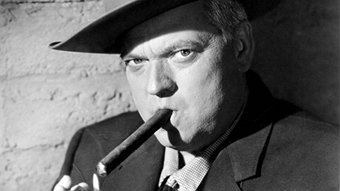It was a hell of a way to prove that radio works.
In 1938, legendary actor and radio personality Orson Welles staged a radio play about an alien attack on earth. It was so realistic, it caused millions of Americans to run for their lives and hide.
Now that the panic has died down, ABC Digital Extra will present a special 75th anniversary Pop Up broadcast to celebrate one of the most significant events in the history of radio.
Originally written in the closing years of the 19th century by H.G. Wells, (no relation to Orson Welles) on the surface, The War of the Worlds tells the story of a Martian invasion of the Earth.
Deeper down it’s been interpreted as a commentary on evolutionary theory, on Victorian morals and beliefs, and on colonial imperialism and the British Empire.
H.G. Wells was a science teacher and later became a reviewer for the highly respected scientific journal Nature.
His lecturers included the famous biologist Thomas Huxley, often referred to as Darwin’s bulldog for his strong advocacy of Charles Darwin’s theory of evolution, a central theme in the novel.
The now famous Orson Welles radio adaptation of The War of the Worlds was performed as a Halloween episode of the American radio drama anthology series, by the Mercury theatre of the air, and broadcast by CBS from Madison Avenue in New York City on October 30, 1938, the night before Halloween.
Orson Welles directed and narrated the play, which was re-set from the English countryside of Surrey, Essex and the City of London, to the contemporary American hinterland setting of New Jersey and New York City for Welles’ American audience.
In the America of 1938, eyes were turned to Europe and the growing threat of Nazi Germany. The fear of another world war, the evil of fascism, and invasion was ever present in the minds of people.
It was in this environment that Orson Welles adaptation was broadcast.
To increase its realism, the first two thirds of the hour long play was presented as a rolling radio news broadcast, with interviews and live crosses, as events unfolded.
Despite clear identification at the start of the broadcast, anyone tuning in after the program commenced, heard what to many sounded like an actual alien invasion was underway.
Crosses to other programming and technical glitches, added to the realism of that now famous evening.
To celebrate this moment of great radio history, ABC Radio examines the phenomenon of The War Of The Worlds with a special pop-up radio station hosted by Stuart Gary from ABC Science.
You can listen to some of the audio now, here.
The special broadcast also include the following material from the ABC Radio Archives.
COUNTER POINT: Over the years, there have been many reports about the extent of public panic in the streets, generated by the broadcast, with claims of horrified listeners believing the events being reported were really happening live on air. While this undoubtedly occurred to some extent, the true level of panic remains under debate. More certain, was the outrage and condemnation expressed by newspapers and public figures, in response to the plays use of a realistic news format. Also just as certain, the controversy it generated secured Orson Welles’ fame as a great American dramatist. But was it all really, as some would say, an historically important lesson on the media’s ability to produce mass panic, hysteria and even suicide? Associate Professor Michael J. Socolow from the University of Maine told the ABC’s counterpoint on the eve of the 70th anniversary of the broadcast, that all those claims won’t history, but hype.
RADIO EYE: The ABC’s Radio Eye program with Brent Clough, examined in significant detail the works of Orson Welles, including the war of the worlds. It shows him as a strong and highly politically motivated artist committed to both his profession and social beliefs. This program looks at both the war of the worlds, and another key play The Fall of the City.
JEFF WAYNE’S MUSICAL VERSION: Jeff Wayne’s 1978 musical version of the novel introduced H.G. Wells’ original story line to a new generation. Wayne’s adaptation returned the story to its original 19th century English setting, yet provides a futuristic flavour by adding progressive rock music, electronic synths, and a string orchestra, with rhyming melodic lyrics and a mostly first person narrative by Richard Burton, faithful to the original storyline. The combination creates a truly amazing atmosphere, sweeping you along and sparking emotions of hope, the horror of war and defeat, the depths of despair and desperation, and finally a victory of sorts, at least for now. You will also hear a lengthy conversation with Jeff Wayne recorded by 774 ABC Melbourne.
THE TRIPLE J VERSION FROM THE EARLY 1990s: Under the direction of triple J producer Graeme Bartlett, the play combined the Orson Welles adaptation with music designed to put triple j’s own unique style into the famous play.
STARTS: 2:00AM, Wed 30 Oct
ENDS: 11:59PM, Thu 31 Oct

